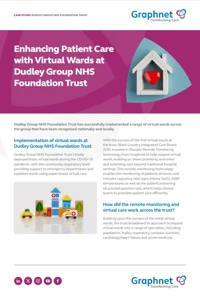Enhancing Patient Care with Virtual Wards at Dudley Group NHS Foundation Trust
10 July 2024
Dudley Group NHS Foundation Trust has successfully implemented a range of virtual wards across the group that have been recognised nationally and locally.
Implementation of virtual wards at Dudley Group NHS Foundation Trust
Dudley Group NHS Foundation Trust initially deployed basic virtual wards during the COVID-19 pandemic, with the community respiratory team providing support to emergency departments and inpatient wards using paper based virtual care.
With the success of the first virtual wards at the trust, Black Country Integrated Care Board (ICB) invested in Docobo Remote Monitoring technology from Graphnet to help expand virtual wards, building on these promising outcomes and extending care beyond traditional hospital settings. This remote monitoring technology enables the monitoring of patients at home, and includes capturing vital signs (Home SpO2, NiBP, temperature) as well as the patient answering structured question sets, which helps clinical teams to prioritise patient care efficiently.
How did the remote monitoring and virtual care work across the trust?
Building upon the success of the initial virtual wards, the trust broadened its approach to expand virtual wards into a range of specialties, including: paediatrics, frailty, respiratory, complex nutrition, cardiology/heart failure and acute medicine.
Working collaboratively with the ICB, the trust and Graphnet, the team developed the first paediatrics virtual ward in the country, which has received excellent feedback from clinicians and from local families using the service. As well as managing children with illnesses, such as Respiratory Syncytial Virus (RSV) infections, the paediatric virtual ward looks after children with complex needs and conditions including those being stepped down from high dependency care.
Dr Paul Hudson, operational medical director at Dudley Group NHS Foundation Trust, who heads up virtual care says:
We initially thought a paediatric virtual ward would be useful to manage the anticipated increase of children being admitted with RSV, but it proved invaluable for children being stepped down from higher dependency care, as well as managing patient flow in the trust. By giving access to support by expert clinicians, we are giving children and young people a better patient experience and journey and care tailored to their conditions.
How does the virtual ward work?
When the child is discharged home, parents are given training on virtual wards. Question sets are scheduled to be completed within specific two-hour windows throughout the day, with 24-hour access to the paediatric telephone support remaining available for any time it may be required. Parents or guardians receive regular telephone contact from their specialist team to discuss any concerns and to review the patient and relevance of the virtual ward service.
Outcome and impact of the virtual ward
The adoption of virtual wards has led to improvements in patient outcomes, including reduced length of stay and reduction in hospital readmissions. One example is the case of a patient with electrolyte imbalances and renal failure
who demonstrated a remarkable 90% drop in hospital attendance following admission to the complex nutrition virtual ward, demonstrating a positive impact on the patient’s life.
This multidisciplinary team approach and collaboration between acute medicine units, community teams and specialists has facilitated seamless patient onboarding and continuity of care.
A mother whose child had been cared for on the virtual ward, praised the paediatric virtual ward for providing personalised care to her son, allowing her to record observations throughout the day and receive reassurance from healthcare professionals through regular calls. She said:
Now my son is on the virtual ward I can record his observations as many times as I want throughout the day and a member of staff calls me twice daily which reassures me that he is safe in our home environment. The new virtual ward is great for me and my family as it stops my son staying in hospital longer than he needs to.
This approach not only ensured her son’s safety in the home environment but also minimised unnecessary hospital stays, positively impacting the family’s quality of life.
Dr Paul Hudson says:
We are onboarding 10 or more patients per day, and this has equated to significant bed
days saved, so the virtual ward programme has proved to be cost-effective. We have been very lucky that a lot of our wards are run by very engaged people who have embraced this new approach. The impact of virtual wards on enhancing patients’ quality of life is great. The patients and families really do appreciate it.
Through continuous innovation and collaboration, Dudley Group NHS Foundation Trust continues to optimal outcomes for patients and their families.










